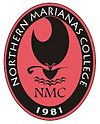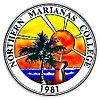- Northern Marianas College
-
Northern Marianas College 

Established 1981 Type 2 year Community College Endowment Territory supported with significant U.S. federal grants received President Carmen Fernandez Students 1,299 (2005 figure); 930 (2007 figure) Location Saipan, Northern Mariana Islands Campus 14 acres Website www.nmcnet.edu Northern Marianas College (NMC) is a two-year community college located in the United States Commonwealth of the Northern Mariana Islands (CNMI). The college was founded in 1981 by Agnes McPheteres in a renovated former United Nations Trust Territory of the Pacific Islands hospital on Saipan where its main campus remains to this day.[3] NMC today has three campuses on the islands of Saipan, Tinian, and Rota, with the Tinian and Rota campuses no longer offering academic classes. The main campus on Saipan lies in the region of Micronesia in the western Pacific, approximately 3500 miles west of Hawaii, 1500 miles south of Japan, and 100 miles north of Guam. NMC is the sole public college within the Commonwealth and is accredited by the Western Association of Schools and Colleges, although the school has historically faced challenges in this regard[4][5] (scroll down to "Marshall Islands, CNMI" section of source, and see "Leadership and accreditation issues" section below on this page). Its current president is Carmen Fernandez. Former presidents include Keith Pointer, Agnes McPhetres, Joaquin Sablan, Kenneth Wright, Tony De Leon Guerrero, and numerous acting presidents over relatively long time periods.[6]
Contents
Academics
Northern Marianas College offers degrees and certificate programs from seven departments:
- Business
- Human Performance and Athletics
- Languages and Humanities
- Nursing
- School of Education (four-year program)
- Sciences, Mathematics and Vocational Education
- Social Sciences and Fine Arts
 View of an area of the Northern Marianas College campus, 2005. On the right is the library. On the left are various administration offices. In the back is National Public Radio station KRNM.
View of an area of the Northern Marianas College campus, 2005. On the right is the library. On the left are various administration offices. In the back is National Public Radio station KRNM.
Although NMC is a two-year college, it also grants bachelor's degrees through its School of Education. The average class size at NMC is around 15 students, though enrollment officials seek to fill most classes to the official cap of 25.
NMC students who pursue education higher than an associate's degree usually attend the University of Guam or the University of Hawaii. Some transfer to the U.S. mainland, while most who forego further education and have "local" status or U.S. citizenship attempt to enter jobs within predominantly the CNMI public sector.
In addition to its mandate embodied in the Northern Mariana Islands Commonwealth Constitution to provide higher education to CNMI citizens, NMC seeks to attract Asian students who wish to learn English as a Second Language (ESL).[7] The Northern Marianas Islands is the closest United States territory to many Asian countries. International students are not required to apply for a student visa with U.S. Citizenship and Immigration Services, since the CNMI controls its own immigration and labor laws locally, not without controversy (see George Miller (politician) [8]); NMC assists students in obtaining student visas from the CNMI government and there is no entrance examination requirement at NMC for students taking ESL. Although the majority of island English-speaking residents and student English-speakers at NMC do not speak standard American English (also see Standard English),[9] [10] most instructors at the college do.
Challenges
Dwindling finances and program issues
Along with the CNMI's current economic recession, the college has faced severe budget cuts beginning in 2006. [11] The normal 2006 Summer II term was canceled altogether.[12] Tuition was raised by 31 percent beginning in the Fall 2006 term [13] and student enrollment dipped by nearly the same amount.
In September 2006, the salaries and length of work-weeks of most employees at the college were cut by 10 percent.[14] During that same month, NMC's U.S. $277,000 United States Department of Education Adult Basic Education grant was transferred over to the CNMI Public School System. [15] The college's film school was closed in 2005 and its nursing program has been continually plagued with problems. [16] [17] [18] [19] On August 7, 2007, the nursing program's acting chair stated she was leaving on Aug. 18, with no replacement in sight and faculty numbers down to four (including one adjunct) for the program's 30 students in the fall.[20]
In May 2007, the CNMI Governor signed House Bill 15-222 into law (Public Law No. 15-58) authorizing NMC to secure a $250,000 loan to repair and renovate its dilapidated buildings and classrooms.[21]
Leadership and accreditation issues
In addition, a bill that would have required higher education credentials of all members of the college's governing board and that the college president hold an earned doctorate [22] was withdrawn in May 2006 from the CNMI legislature,[23] who is responsible to give advice and consent to the CNMI governor about board appointees.[24]
During an October 2006 visit by the Western Association of Schools and Colleges, the WASC lead official "noted that although NMC committed to do so 16 years ago, the college still has not established a process for regular program review and assessment". The same official stated that WASC was "deeply disappointed" that NMC had not made significant progress in doing so.[25] In December 2006, WASC stated that NMC's accreditation was "at serious risk" because it lacked qualified administrative leadership.[26]
 President Carmen Fernandez explains on 8 Feb 2008 on Saipan's KSPN Cable News why the WASC's delivery of a "Show Cause" (to show why the college should retain its U.S. accreditation) mandate "was such a shock".
President Carmen Fernandez explains on 8 Feb 2008 on Saipan's KSPN Cable News why the WASC's delivery of a "Show Cause" (to show why the college should retain its U.S. accreditation) mandate "was such a shock".
The February 5, 2007, Saipan Tribune, and later the May 18, 2007 edition of the Chronicle of Higher Education, reported that WASC placed NMC on probation until June 2008. Handed down by the senior-college commission, as well as by the association's community-college commission, their statement said it was concerned with "inadequate and unstable administrative leadership, inadequate faculty and staff, cuts in public funding, inadequate planning and resource allocation," and "serious deficiencies in the quality of education and services offered to students at off-campus sites, as well as the continuing failure to institutionalize program review, systematically assess student learning," or develop programs to meet the needs of the local labor market. The commission was also concerned about what it saw as the lack of experience of the college's governing board, financial instability, drops in enrollment, and poor completion rates, and the institution's lack of autonomy from the government of the Northern Marianas Islands, a commonwealth affiliated with the United States.
Danny O. Wyatt, Acting President of the college, replied that the "probation sanction was handed down because of an accumulation of organizational problems going back as far as 1990." He stated that the college has suffered from a lack of leadership and that past institutional promises to WASC to improve the institution after being placed on warning status simply were not carried out. The accreditor got "sick and tired of the excuses," according to Wyatt (23 Aug 2007 Marianas Variety). Wyatt later resigned in January 2008 after over 10 years with NMC.[27]
After the college hired a new president, Carmen Fernandez, on April 27, 2007 (the college's fifth president in the past six years),[28] WASC in February 2008 still saw no substantive action on the accreditation issue. WASC then ordered NMC to "Show Cause" as to why its accreditation should not be pulled and to prepare for closure within six months.[29][30] Echoing the same language used in its 2000 and 2006 reports to the college,[31] the WASC report justified its action based upon the college's
inadequate and unstable administrative leadership, inadequate faculty and staff, cuts in public funding, inadequate planning and resource allocation in conformity with NMC’s mission, serious deficiencies in the quality of education and services offered to students at off-campus sites as well as continuing failure to institutionalize program review, systematically assess student learning, or develop programs in relation to the needs of the Commonwealth of Northern Mariana Islands labor market, lack of institutional autonomy vis a vis the commonwealth government, an inexperienced and thus far untrained board of (regents), financial instability, [and] drops in enrollment and completion rates.[32]
College officials were in shock and dismay at the action and promised to try to save the college's accreditation.[33] Saipan's only NPR radio station, KRNM (FM), which is housed on the NMC campus and has long been viewed by campus officials as a drain to the college, also stands to shut down over the matter (8 Feb 2008 KSPN Cable News).
The CNMI Washington representative, Pedro A. Tenorio, commented, "It is extremely important that our sole publicly supported institution of higher education be as strong as it can be. It is imperative that we all pitch in to save NMC for only through education and skill development can the people of the CNMI and the CNMI as a whole address economic crisis and the challenges of the 21st century."[34]
Addressing of accreditation issues
In early June 2009, NMC submitted its final report to WASC after remaining on "Show Cause" threatened accreditation status. WASC had laid out a pathway for NMC to save its accreditation, making eight recommendations. Six of the eight had apparently already been met as NMC made its final report, addressing the remaining two.[35] In August 2009 NMC's accreditation was fully reconfirmed by WASC until 2012.
See also
External links
- Official website
- Weekly official updates from the NMC President's office - not updated since October 24, 2007
Categories:- Education in the Northern Mariana Islands
- Universities and colleges in the Northern Mariana Islands
- Universities and colleges in United States insular areas
- Schools accredited by the Western Association of Schools and Colleges
- Saipan
Wikimedia Foundation. 2010.

